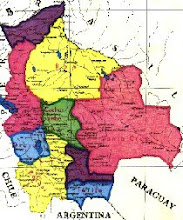 VICTORY CELEBRATION -- Autonomia supporters in Trindad, capital of Beni El Deber
VICTORY CELEBRATION -- Autonomia supporters in Trindad, capital of Beni El Deber "Si" cruises to easy wins
The "autonomia" movement, as expected, picked up a pair of easy wins in the less populous northern departments of Beni and Pando Sunday.
In final, but not yet official results, the "yes" vote was around 80.5 percent in Beni, and 81.6 percent in Pando. A similar measure had passed with about 85 percent of the vote in the much larger department of Santa Cruz a month ago.
There were a few scattered reports of protests or violence, and many charges and countercharges of voting irregularities, but newspaper accounts indicated that things had gone remarkably smoothly.
If Tarija, a larger state with important gas and oil resources on the southern side of Bolivia, also passes a pro-autonomia measure, which it is expected to do on June 22, that will complete the construction of a "media luna," or "half moon" of departments in the east and south of the country that have voted to disconnect themselves, in ways not entirely clear as yet, from the control of the national government. That government is headed by President Evo Morales, a socialist and ally of Venezuelan preident Hugo Chavez.
Two of Bolivia's other five departments -- Cochabamba and Chuquisaca -- have growing pro-autonomic movements, but are more closely divided and have not scheduled votes on the concept.
The national government maintains that the referendums and subsequent actions taken by the local government in Santa Cruz are illegal. The issue cannot be adjudicated because there is no functioning Supreme Court as a result of the political impasse in the country. (Morales forced several justices to resign and no replacements have been forthcoming in part because the opposition to Morales controls the national senate.)
Morales and his party, the Movement Toward Socialism (MAS), had little hope of defeating the measure, but had urged people to show their displeasure by not voting. The government appeared to have had some success in this regard. The turnout in Pando was 68.9 percent, and in Beni it was 58.7 percent, lower than had been the case in Santa Cruz and probably a little low by Bolivian standards though it was hard to know how to evaluate it. This was, at bottom, a one-question referendum in which the outcome had not been in doubt.
The "autonomia" movement, as expected, picked up a pair of easy wins in the less populous northern departments of Beni and Pando Sunday.
In final, but not yet official results, the "yes" vote was around 80.5 percent in Beni, and 81.6 percent in Pando. A similar measure had passed with about 85 percent of the vote in the much larger department of Santa Cruz a month ago.
There were a few scattered reports of protests or violence, and many charges and countercharges of voting irregularities, but newspaper accounts indicated that things had gone remarkably smoothly.
If Tarija, a larger state with important gas and oil resources on the southern side of Bolivia, also passes a pro-autonomia measure, which it is expected to do on June 22, that will complete the construction of a "media luna," or "half moon" of departments in the east and south of the country that have voted to disconnect themselves, in ways not entirely clear as yet, from the control of the national government. That government is headed by President Evo Morales, a socialist and ally of Venezuelan preident Hugo Chavez.
Two of Bolivia's other five departments -- Cochabamba and Chuquisaca -- have growing pro-autonomic movements, but are more closely divided and have not scheduled votes on the concept.
The national government maintains that the referendums and subsequent actions taken by the local government in Santa Cruz are illegal. The issue cannot be adjudicated because there is no functioning Supreme Court as a result of the political impasse in the country. (Morales forced several justices to resign and no replacements have been forthcoming in part because the opposition to Morales controls the national senate.)
Morales and his party, the Movement Toward Socialism (MAS), had little hope of defeating the measure, but had urged people to show their displeasure by not voting. The government appeared to have had some success in this regard. The turnout in Pando was 68.9 percent, and in Beni it was 58.7 percent, lower than had been the case in Santa Cruz and probably a little low by Bolivian standards though it was hard to know how to evaluate it. This was, at bottom, a one-question referendum in which the outcome had not been in doubt.


No comments:
Post a Comment